High Order Thinking Skills (HOTS) - Class 6 MCQ
20 Questions MCQ Test - High Order Thinking Skills (HOTS)
Read the following paragraph and answer the questions that follow.
Shobhit performed the following activities at home.
He soaked green gram (moong) seeds in water overnight in a bowl. Next morning, he drained out the excess water and kept the wet seeds in the folds of a muslin cloth. (We should keep the cloth moist all the time by sprinkling the water at regular intervals [once or twice every day]).After another 24 hours, he checked them again. He saw that the seeds began to sprout.
Q. Choose the correct option and answer the following questions.
I. Which part of the plant is used in the previous activity?
II. What makes the nutrient contents increase in the seeds?
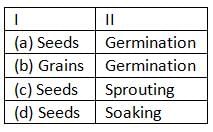
He soaked green gram (moong) seeds in water overnight in a bowl. Next morning, he drained out the excess water and kept the wet seeds in the folds of a muslin cloth. (We should keep the cloth moist all the time by sprinkling the water at regular intervals [once or twice every day]).After another 24 hours, he checked them again. He saw that the seeds began to sprout.
I. Which part of the plant is used in the previous activity?
II. What makes the nutrient contents increase in the seeds?

Take small amount of food sample in a test tube. Put a few drops of iodine on it. Note down the change in colour. Bluish black colour indicates the presence of (a). The food product (b) can be used for this experiment.
Q. Choose the correct option from ‘a’ and ‘b’ and answer the question.
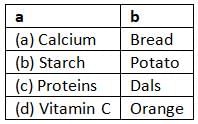

The thin strand of _______________ that we see, are made up of still thinner strand called __________________.
Swati, Sanchit, Surbhi and Sakshi were talking about the difference between the weaving and knitting.
Q. Who among them correctly made the difference between weaving and knitting?
Somya poured hot water into two cups made of same material as shown in the figures below.
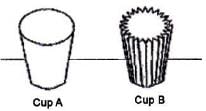
She then realized that she could hold cup B for a longer time as compared to cup A.
Q. Which one of the following best explains this activity?
Salt cultivator Shyam made sea water confined by making a dam. Salt is deposited in his land after a few days. After the purification, he sales the salt in the market.
Q. Choose the correct option to answer the following questions:
I. By which process does Shyam produce salt?
II. By which process does Shyam purify salt?

Which of the following statement(s) is true for formation of compost from vegetable waste:
i. It is a physical change.
ii. An irreversible change and a slow change
iii. A chemical and non-desirable change.
iv. A chemical and desirable change
If bread is baked, the observational changes which support it being a chemical change are:
i. Change in odour
ii. Change in texture
iii. Change in taste
iv. Bread remains bread
The following flow-chart shows the classification of micro- organisms.
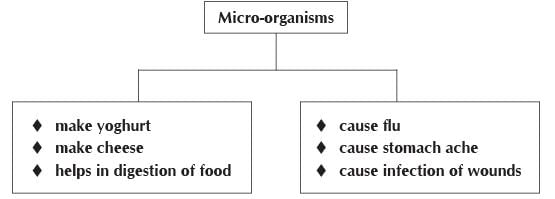
Q. Based on the above information, explain the uses of micro-organisms grouped.
i. Whether they are useful to man
ii. Whether they reproduce from spores
iii. According to the number of cells (single-celled or multi-celled)
The diagrams below show the life-cycle of organisms X and Y.
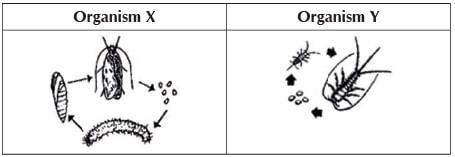
Q. On the basis of the diagrams, which of the following statement(s) is/are true?
i. Both the adults of organisms X and Y are able to fly.
ii. The young of organism X does not look like its adult while the young of organism Y looks like its adult.
iii. Organism X has a 4-stage life cycle while organism Y has a 3-stage life cycle.
When a lit torchlight is shone on an object X, a shadow is formed on the screen.
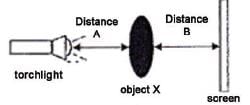
Q. Which of the following options shows how the size of the shadow changes when the distance A and/or distance B changes?

John prepares an electric circuit. Study the circuit and find out the correct option.
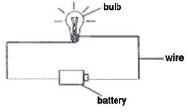
Q. In the circuit given above, electricity passes through the___________
The following picture shows two circuits with batteries and light bulbs.
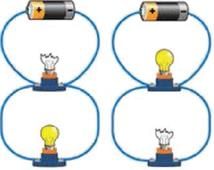
Q. Choose the option which explains the above figure correctly.
Shivani wanted to find out whether a nail was magnetized. She put the nail near a magnet, a compass and a paper clip. Then, she recorded the observations as follows:
i. It could move the compass needle.
ii. It attracted the paper clip.
iii. It attracted the magnet.
iv. It repelled the magnet.
Q. From which of the observations can she ensure that the nail was magnetized?
Look the following compass carefully
Now, observe the following arrangements of magnet and compass and find out which of the following shows the direction of compass when they are put near a bar magnet?

Which organ system is primarily responsible for transporting nutrients, oxygen, and wastes to and from cells?
Arav performed the following experiment.
He pasted a piece of paper onto the inner bottom surface of a glass. He turned the glass upside down and pushed it into a basin of water. He noticed that the paper remained dry.

Q. Which property of air does this experiment show? Choose the correct option.
The amount of precipitation that soaks into the soil depends on
James climb on the roof of a 7 story building and drops a stone from there. What kind of motion does the stone have?
An electric fan switched on in your room is said to be in motion, even though the fan is fixed to the ceiling. It is because:














